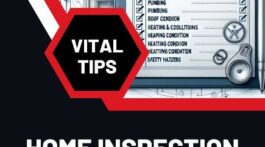In the grand affair of purchasing a dream home, an essential yet often overlooked aspect is the home inspection – a critical bridge between your initial excitement and long-lasting satisfaction.
With real estate complexities constantly evolving, understanding typical home inspection costs in Massachusetts is crucial, as every dollar counts in this significant investment journey.
We will illuminate the intricacies of Massachusetts home inspection pricing and provide valuable tips for potential buyers navigating this critical terrain. Deciphering these costs can help ensure your new residence is visually delightful, structurally sound, and free from hidden mortifications.
Read on to arm yourself with knowledge that could save thousands in unplanned expenses.
According to industry research, Massachusetts’s average home inspection cost can range from $300 to $600. However, it is essential to note that the exact price may vary depending on factors such as the size and location of the home, as well as what is being inspected.
Specialty inspections for radon, well water, termites, or asbestos may incur additional costs ranging from $25 to $200. To get an accurate estimate for your specific situation, it’s recommended to consult with local home inspectors in your area of Massachusetts.
From many years of experience in being involved with home inspections, the inspector you choose can have significant consequences. Choosing one inspector over another because they are cheaper in price usually isn’t the best move.
The property your purchasing is a significant investment. The best advice is to choose an inspector based on qualifications, not price. Trying so save $50 could cost you tens of thousands in missed issues with the wrong home inspector.
When buying a home, you must get this right. Let’s examine everything you should know, including helpful tips.
Understanding Home Inspection Costs in Massachusetts
Before diving into the specifics of average home inspection prices in Massachusetts, it’s crucial to understand what factors influence the cost and what you can expect during this process.
A home inspection is a comprehensive evaluation of a property’s condition. It aims to identify potential issues or defects that may affect its value or safety.
A qualified and experienced Massachusetts home inspector will assess various aspects of the property, including the structural components, major systems (such as roofing, electrical, HVAC, appliances, and plumbing), insulation, and exterior and interior surfaces.
During the inspection, the inspector will thoroughly examine these areas for any signs of damage, deterioration, or safety hazards. They may also use specialized tools such as moisture meters, thermal imaging cameras, or radon detectors to gather more information about hidden issues.
While a home inspection doesn’t guarantee perfection or uncover every minor flaw, it can provide valuable insights to help you make an informed decision about purchasing the property.
For instance, imagine you’re considering buying an older home with a history of water damage. A thorough home inspection might reveal hidden mold growth within the walls or a compromised foundation due to excessive moisture.
Armed with this knowledge, you can decide whether to proceed with the purchase, ask for a seller’s concession, or negotiate repairs with the seller.
Understanding the purpose and process of a home inspection sets the stage for determining how much it will cost. So, let’s now explore average home inspection prices.
Noteworthy Statistics
- According to the US Department of Housing and Urban Development, the average home inspection cost in 2023 ranges between $300 and $500. The home inspection cost in Massachusetts is slightly higher than the national average.
- The exact price can change based on factors like the size of the dwelling, with larger homes often requiring a more expensive inspection due to increased time and complexity.
- Specialty inspections such as radon or termite screening can add additional costs, ranging from $25 to $200, depending on the specific requirements of the inspection.
Average Home Inspection Prices in Massachusetts
Massachusetts’s average home inspection cost typically ranges from $300 to $600. However, it’s essential to note that prices can vary depending on several factors.
Some of these factors include the size of the property in question and its location. Larger homes generally require more time and effort to inspect thoroughly, which can result in higher costs. Similarly, homes in urban areas or regions with higher living costs may have slightly higher inspection fees.
I reached out to Kevin Vitali, owner of Merrimack Valley Real Estate, to get his perspective on home inspection pricing. Kevin works in the Merrimack Valley area, about 53 miles Northwest of Boston. Kevin has been a Realtor for 23 years, so he has tremendous experience with what Massachusetts home inspectors charge.
Here is what Kevin had to say.
For a top-notch home inspector you can expect to pay around $500-600 for a thorough inspection of a single-family home. Inspection expenses can vary slightly up or down depending on the size of the house.
Kevin’s perspective is similar to my own. Pricing is comparable in the Metrowest area of Massachusetts, about 30 miles West of Boston. When you go significantly further out into areas of Western Massachusetts, the expense will drop.
Making a Sound Investment in Homeownership
To put things into perspective, think of a home inspection as an investment in your future. You wouldn’t hesitate to spend more on a high-quality car or important life decisions.
Investing in a thorough home inspection ensures you have the necessary information to make informed decisions about one of the most significant investments in your life – your home.
While these average prices provide a general idea, it’s essential to understand the factors that can influence the cost of a Massachusetts home inspection.
Let’s explore these factors in more detail.
Factors Influencing Massachusetts Inspection Costs
Several factors come into play when determining the cost of a home inspection in Massachusetts. Understanding these factors can help you budget accordingly and make an informed decision.
Here are the key elements that influence inspection costs:
1. Location: The property’s location can impact the home inspection cost. You might expect inspections to be more costly in areas with higher living expenses or where property values are generally higher.
2. Size and Complexity: The size of the home and its complexity also affect the inspection costs. More significant properties require more time and effort to inspect thoroughly, which can lead to higher fees.
3. Age of the Home: Older homes tend to have more components and potential issues, which may require additional time during the inspection process. As a result, inspections for older properties may be more expensive than newer ones.
4. Additional Services: Depending on your needs and concerns, you may opt for additional services such as radon testing, mold, well-water, or pest inspections. These extra services may incur additional charges.
5. Inspector’s Qualifications and Experience: The qualifications and experience of the home inspector can also impact the cost. Highly skilled and experienced inspectors often charge higher fees due to their expertise and reputation in the field.
Now that we better understand what factors influence inspection costs, let’s explore another aspect of home inspections – specialty inspections.
Specialty Home Inspections in Massachusetts
In addition to standard home inspections covering a property’s major systems, various specialty inspections focus on specific areas or concerns.
These specialized inspections delve deeper into particular aspects of a home, providing buyers with a more comprehensive understanding of potential issues.
Here are some common types of specialty home inspections:
1. Radon Testing: Radon is a colorless and odorless gas that can be harmful if present in high levels. Radon testing involves using specialized equipment to detect and measure radon levels in a home. This type of inspection is significant in areas known for high radon concentrations.
2. Mold Inspection: A mold inspection assesses the presence of mold within a property and identifies the type and extent of the mold growth. This inspection can help determine any underlying moisture issues or potential mold-related health hazards.
3. Pest Inspections: Pest inspections focus on identifying the presence of pests, such as termites, rodents, or insects, that could cause damage to the structure of the home. These inspections are especially crucial in areas prone to specific pests.
4. Private Water Inspection: If a private well services the home, it is critical to check the quality and quantity of the well. The cost of a well inspection is worth it, given your health and safety in drinking potable water.
5. Sewer Line Inspection: This inspection involves examining the condition of the sewer line to identify blockages, leaks, or potential problems that may require costly repairs or replacements.
Suppose you’re considering purchasing an older home with a history of plumbing issues. In addition to a standard home inspection, you might want to include a sewer line inspection to ensure no hidden problems could become expensive headaches down the line.
By opting for specialty inspections based on your specific concerns, you can gain a more comprehensive picture of the property’s condition and potential issues before making a final decision.
Preparing for Home Inspection Expenses in Massachusetts
Being prepared for the expenses associated with a home inspection is crucial for a prospective home buyer. Here are some steps you can take to ensure you are ready financially:
- Research Average Costs: Familiarize yourself with your area’s average home inspection cost. This will give you a baseline understanding of what to expect and help you plan accordingly.
- Set Aside Funds: Start setting aside funds designated explicitly for home inspection expenses. By having this money saved up in advance, you won’t be caught off guard when it’s time to pay for the inspection.
- Budget for Additional Costs: Consider any potential additional inspection costs discussed earlier, such as specialized inspections or tests. Factor these into your budget to ensure you have enough funds to cover all necessary inspections.
- Get Multiple Quotes: Don’t hesitate to contact multiple home inspection companies and request quotes from each. This will enable you to compare prices and services, helping you make an informed decision while considering your budget.
- Prioritize Quality: While it’s important to consider costs, remember that the quality and expertise of the home inspector are also crucial factors. Don’t solely base your decision on price; make sure to evaluate the qualifications and experience of the inspector as well.
By taking these steps and adequately preparing for home inspection expenses, you can confidently approach the process and ensure that you have allocated sufficient funds to evaluate your potential new home thoroughly.
Tips on Choosing Home Inspection Services
Now that you understand the importance of a home inspection and its associated costs let’s explore some valuable tips to help you choose the right home inspection services.
It is recommended that multiple quotes be gathered from different professional inspectors. Remember that the cost should not be the sole determining factor; instead, focus on finding an inspector with extensive experience, industry certifications, and positive references.
Look for professionals who are part of reputable associations such as ASHI (American Society of Home Inspectors) or InterNACHI (International Association of Certified Home Inspectors). These affiliations often guarantee a certain level of competency and adherence to ethical standards.
I’ve recommended home inspectors with these credentials throughout my real estate career.
Consider seeking recommendations from your real estate agent or trusted referrals who have recently undergone home inspections. Their firsthand experiences can provide valuable insights into the quality of service you can expect from different providers.
Look over reviews carefully.
You Should Receive a Thorough Home Inspection Report
Ultimately, aim to find someone to examine your prospective property and effectively communicate their findings thoroughly. You should expect a thorough home inspection report as part of the job.
The inspection report will detail the results and the scope of any repairs or noted concerns. Items that need to be addressed immediately are usually highlighted.
Lastly, remember that time is of the essence when deciding on an inspector. Ensure they accommodate your preferred timeline for completing the inspection report before closing the house.
A quality Massachusetts inspector should be able to commit to a reasonable timeframe without compromising thoroughness.
For instance, imagine you have an experienced inspector with glowing recommendations but cannot complete the inspection before your home inspection contingency expires.
Exploring other options that align with your schedule would be wise.
Considering these tips and utilizing a thoughtful approach, you can confidently select a Massachusetts home inspection service that meets your needs, ensuring a comprehensive assessment of the property you intend to purchase.
Doing so will give you peace of mind you’re making the best decision during the home-buying process.
FAQs
Here are some questions people often ask about inspections and their answers.
Is the Cost of a Home Inspection Negotiable?
Yes, the cost can sometimes be subject to negotiation. While there is a typical price range for an examination, inspectors are often willing to consider negotiation based on various factors.
These factors may include the square footage and complexity of the property, its location, the inspector’s availability, and even the current market conditions. Potential homebuyers or sellers should negotiate respectfully with the inspector to establish a mutually acceptable service fee.
Nevertheless, it is essential to remember that while negotiation is an option, it may not always lead to a significant reduction in cost due to the expertise and time required to conduct a comprehensive inspection.
Are There Price Ranges on Different Types of Properties?
Yes, there are various price ranges for different types of houses. The cost of a home inspection can fluctuate depending on factors such as the property’s size, age, location, and complexity.
Larger homes or properties with multiple units may necessitate more extensive inspection efforts, resulting in higher costs. Likewise, older homes may have more potential issues that require thorough examination, leading to higher inspection fees.
Homes in remote areas or regions with higher living costs might incur slightly higher inspection fees than those in more accessible or affordable regions.













No Comment